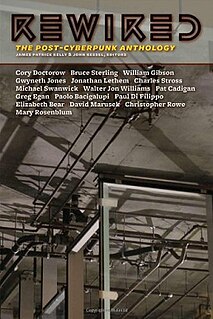Related Research Articles

Michael Bruce Sterling is an American science fiction author known for his novels and short fiction and editorship of the Mirrorshades anthology. Sterling's first science fiction story, Man-Made Self, was sold in 1976. He is the author of science fiction novels including Schismatrix (1985), Islands In The Net (1988), and Heavy Weather (1994). In 1992, he published his first nonfiction book, The Hacker Crackdown: Law And Disorder On The Electronic Frontier.
Cyberpunk is a subgenre of science fiction in a dystopian futuristic setting that tends to focus on a "combination of lowlife and high tech" featuring advanced technological and scientific achievements, such as artificial intelligence and cybernetics, juxtaposed with a degree of breakdown or radical change in the social order. Much of cyberpunk is rooted in the New Wave science fiction movement of the 1960s and 1970s, when writers like Philip K. Dick, Roger Zelazny, John Brunner, J. G. Ballard, Philip José Farmer and Harlan Ellison examined the impact of drug culture, technology, and the sexual revolution while avoiding the utopian tendencies of earlier science fiction.

Stephen Baxter is an English hard science fiction author. He has degrees in mathematics and engineering.

John Kessel is an American author of science fiction and fantasy. He is a prolific short story writer, and the author of four solo novels, Good News From Outer Space (1989), Corrupting Dr. Nice (1997), The Moon and the Other (2017), and Pride and Prometheus (2018), and one novel, Freedom Beach (1985) in collaboration with his friend James Patrick Kelly. Kessel is married to author Therese Anne Fowler.
The Shaper/Mechanist universe is the setting for a series of science fiction short stories written by the author Bruce Sterling. The stories combined cover approximately 350 years of future history, for the period ranging from AD 2200–2550.

Francis Paul Wilson is an American author, primarily in the science fiction and horror genres, and a medical doctor.

Jonathan Strahan is an editor and publisher of science fiction. His family moved to Perth, Western Australia in 1968, and he graduated from the University of Western Australia with a Bachelor of Arts in 1986.

Speed of Dark is a near-future science fiction novel by American author Elizabeth Moon. The story is told from the first person viewpoint of a person with autism. It won the Nebula Award for Best Novel in 2003, and was also an Arthur C. Clarke Award finalist.
Keith Brooke is a science fiction author, editor, web publisher and anthologist from Essex, England. He is the founder and editor of the infinity plus webzine. He also writes children's fiction under the name Nick Gifford.
"Red Star, Winter Orbit" is a short story written by William Gibson and Bruce Sterling in the 1980s. It was first published in Omni in July 1983, and later collected in Burning Chrome, a 1986 anthology of Gibson's early short fiction, and in Sterling's 1986 cyberpunk anthology Mirrorshades. The story is set in an alternate future where the Soviet Union controls most of the Earth's resources, especially oil. As a result of this the United States is no longer a dominant economic power on earth and the Soviets have won the space race.

The 55th World Science Fiction Convention (Worldcon), was LoneStarCon 2, also known as "The Second Occasional LoneStarCon Science Fiction Convention & Chili Cook-off". The convention was held August 28–September 1, 1997, at the Marriott Rivercenter, Marriott Riverwalk, and the Henry B. Gonzalez Convention Center in San Antonio, Texas, United States. The first LoneStarCon, held in Austin, Texas, had been the North American Science Fiction Convention (NASFiC) in 1985, when the 43rd Worldcon was held in Australia.

Year's Best SF 2 is a science fiction anthology edited by David G. Hartwell that was published in 1997. It is the second in the Year's Best SF series.
"Service Call" is a science fiction short story by American writer Philip K. Dick. It was first published in Science Fiction Stories, July 1955.

Rewired: The Post-Cyberpunk Anthology is a collection of postcyberpunk short stories, published by Tachyon Publications and edited by James Patrick Kelly and John Kessel. It features 16 short stories which fall into the loose categorisation of postcyberpunk, intercut with excerpts from a series of letters exchanged by Kessel and fellow science fiction author Bruce Sterling in which they discuss and debate the nature of cyberpunk, the implication being that the issues which they raise have led to the formation of the postcyberpunk trend.

The Year's Best Science Fiction: Fourteenth Annual Collection is a science fiction anthology edited by Gardner Dozois that was published in 1997. It is the 14th in The Year's Best Science Fiction series. The collection won the Locus Award for best anthology.
The bibliography of American science fiction author Bruce Sterling comprises novels, short stories and non-fiction.

"Good Night, Moon" is a science fiction short story by Bruce Sterling and Rudy Rucker. It was first published in the online magazine Tor.com October 13, 2010.
Design fiction is a design practice aiming at exploring and criticising possible futures by creating speculative, and often provocative, scenarios narrated through designed artifacts. It is a way to facilitate and foster debates, as explained by futurist Scott Smith: "... design fiction as a communication and social object creates interactions and dialogues around futures that were missing before. It helps make it real enough for people that you can have a meaningful conversation with".

Nebula Awards 27 is an anthology of science fiction short works edited by James Morrow, the second of three successive volumes under his editorship. It was first published in hardcover and trade paperback by Harcourt Brace in April 1993.
References
- ↑ Nick Gevers. "Bruce Sterling: A Good Old-Fashioned Future - an infinity plus review". Infinity Plus. Archived from the original on 24 November 2010. Retrieved 23 October 2010.CS1 maint: discouraged parameter (link)